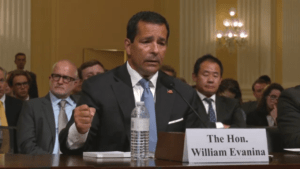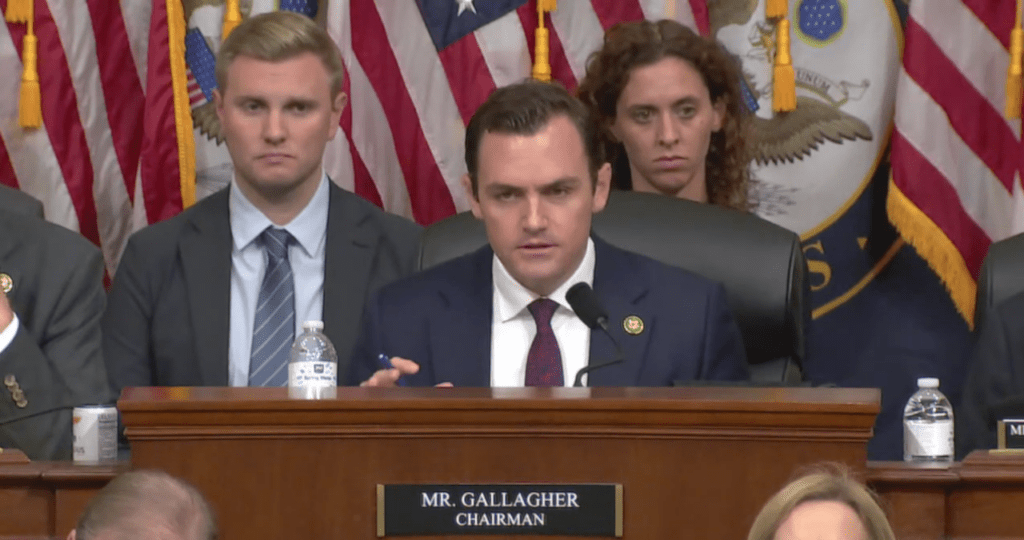Private capital, from venture capital to private equity, bank loans to corporate investment, is starting to understand that Washington is seriously considering placing outbound investment restrictions on them. The target country is China.
In a House Select Committee on the CCP hearing on July 26, one of the three witnesses — Josh Wolfe, co-founder and managing partner at Lux Capital, a venture capital fund in Manhattan — told Chairman Michael Gallagher that he agreed outbound investment restrictions were warranted.
It was an interesting exchange. It was the first question Chairman Gallagher asked once the Q&A session began.
Rep. Gallagher: Do you believe Chinese industries that directly contribute to the development of technologies for the People’s Liberation Army should have access to U.S. capital and our capital markets?
Wolfe: No, no, I don’t.
Rep. Gallagher: Why do you think your colleagues in the VC space continue to invest in such companies? I mean, what are they missing that you seem to understand?
Wolfe: I actually think that the work that your Committee is doing is starting to put a spotlight on the issue. That spotlight might lead partially to shame for some, but I think it’s shining more light on the issue. People that might have invested a decade ago in China might have been doing it under a reasonable inducement that this was an economy that was growing, and that technology there would do like it’s done in the rest of the world: produce more democracy and freedom and choice and options for people. But it’s been very clear over the past few years that it’s the antithesis of that, and that these (new technologies) have become tools of suppression and surveillance. I think that people that made these investments some time ago probably did it with good intent. And now they are stuck in illiquid investments and they have to make a reputational call about what they do in the future. They’ve got to figure out how not to lose their own investors’ money by getting out now. Anybody that’s making new investments in China, I think, is making a massive mistake.
The hearing, titled “Commanding Heights: Ensuring U.S. Leadership in the Critical and Emerging Technologies of the 21st Century”, took place on Wednesday evening.
In his opening remarks, Chairman Gallagher said it was “time for Congress to step up” and “enforce export controls” on the books now, and begin outbound investment restrictions.
The three witnesses were on the same page. They were emphatic that China was a force to reckon with, like no other.
Bill Evanina, former director of the National Counterintelligence and Security Center at the Director of National Intelligence, and now running the Evanina Group, a small consulting firm in Chesapeake Bay, actually compared the discord with China to the war on terrorism.
“The existential threat and unparalleled threat is in the Communist Party of China,” he said in his opening remarks. “It is the most complex, pernicious, strategic, and aggressive threat our nation has ever faced. The CCP’s economic war with the United States, combined with its intent for military supremacy, has manifested itself into a terrorism-like framework.”
Lindsay Gorman, a senior fellow for emerging technologies at the German Marshall Fund, told the Committee that the United States “has woken up to a cold reality that after decades of technological leadership, this position is under severe challenge from an autocratic rival in China.”
She went on to list sectors of the advanced technology space where China was on par with, or in the lead over the U.S., such as 5G, hypersonic missiles, and drone manufacturing capabilities and drone tech innovation. She used the often-cited March 2023 report on this by the Australian Strategic Policy Institute.
Rep. Robert Wittman (R-VA) supported tight locks on capital flow to China.
“We need to say no to U.S. investment into these Chinese companies, period,” he said. “We know we have to move investment away. The question is, how do we do that?”
Wolfe said that for VC firms it starts with “a sense of moral admonishment” first. He said investors have to “decouple the idea of profit over principle.”
“If you think about the flow of capital as basically seasoning and growing these new, advanced technologies, then I think anything we do to slow or thwart that is how you play defense,” Wolfe responded to Wittman. He advised the Committee to “appeal to human interests” when dealing with private capital like those people running VC firms.
“We are patriots, and we want to see this country be the very best country it can be. But we also want to make great profits for our investors,” Wolfe said. “We’re drawn towards investing in cutting-edge technology and emerging technologies and defense technologies because we think it’s a great business,” he said. His company invests in numerous American startups in this space, including American-made drones like Performance Drone Works in Alabama.
Wolfe said that if the private investor community sees policies that support American-made high tech, the money will go there. Ultimately, these companies exist to turn a profit for long-term investors willing to place bets on companies whose technology may be copied, stolen, or surpassed by China developers who can underprice the American manufacturer all day.
He said he was in touch with the Defense Department’s Office of Strategic Capital, which helps fund and scale up new startups of interest to the military.
Rep. Dan Newhouse (R-WA) used his time to get the witnesses’ thoughts on critical minerals needed for the production of microchips, and powerful magnets used by the military. “How can we best address this critical situation?” he asked.
“We’ve long known that China has a market power position in the refining and manufacturing and extracting of critical minerals. This is a huge strategic vulnerability,” Gorman said. “It’s time we start considering ways to reduce that dependency, including with allies and partners like Australia, who have some of these supplies and friend-shoring and creating sort of allied supply chains for some of these minerals where we depend on China.”
 Evanina said the same goes for pharmaceuticals. “I look at the raw materials issue as being analogous to the antibiotics issue,” he said about the FDA’s perennial shortfall in critical medications. U.S. imports of drugs continue to rise because we produce less of it at home. This is especially true for the all-important generic drugs market. “We made a decision decades ago to outsource all this and it now puts us in a precarious position,” he said.
Evanina said the same goes for pharmaceuticals. “I look at the raw materials issue as being analogous to the antibiotics issue,” he said about the FDA’s perennial shortfall in critical medications. U.S. imports of drugs continue to rise because we produce less of it at home. This is especially true for the all-important generic drugs market. “We made a decision decades ago to outsource all this and it now puts us in a precarious position,” he said.
Still, the gist of the hearing was on private capital and how they’d deal with restrictions. If Washington was going to restrict outbound investment, then it also had to signal to the market that it had other partners ready to receive that capital, or had domestic policies which made it financially feasible to invest in that technology here.
“It seems to me you have a very strong moral compass, and that your investment decisions are based on that moral compass and what’s right, what’s wrong, what’s ethical, what’s in the best interest of the United States, et cetera. Are you the exception or are you the rule?” Rep. Carlos Gimenez (R-FL) asked Wolfe.
“I’d like to believe we’re becoming the rule,” Wolfe responded.
They may have no choice, moral compass or not.
On Friday, Bloomberg reported that President Biden is planning to sign an executive order to limit critical U.S. technology investments in China by mid-August, according to people familiar with the matter.
The order focuses on semiconductors, artificial intelligence, and quantum computing. It won’t affect any existing investments and will only prohibit certain transactions. Other deals will have to be disclosed to the government.













